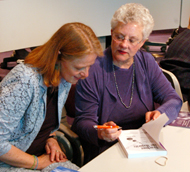Women pursuing majors in sciences and technology are steadily increasing but are still having difficulties pursuing careers in their respective fields due to challenges and obstacles such as balancing work and family responsibilities.
Sue Rosser’s latest book, “Breaking Through the Science Glass Ceiling,” is based on a five-year study exploring the difficulties women face when pursuing careers in academia.
Rosser spoke to a small group in the Monroe Library that consisted of mostly female professors.
Rosser explained that although the percentage of women turning to math and science has greatly increased since 1960, the number of women gaining advanced degrees and pursuing academia has decreased.
Rosser’s study of women engineers and scientists on track for tenure took place between 1997 through 2000. The study explores some of the possibilities of why women are experiencing obstacles and consisted of open-ended questions such as, “What is your biggest challenge as a woman?” Sixty-two to 80 percent answered that balancing a career and a family was their biggest challenge.
The second biggest challenge was time management, with lack of woman leadership coming in third place.
Xio Wallace, an emergency technician student at Delgado Community College, said she didn’t realize how much raw data there was on why women are not progressing, as they should.
“It is nice to see the data interpreted for the progress of women. I found out about this lecture in The Times-Picayune and decided I could benefit from attending,” Wallace said.
Rosser stressed that another common problem is the dual career issue where a woman scientist is likely to marry a man in the same field, and it’s likely his career needs will come first.
“The system in which tenure is rewarded was based on the white males, and we clearly do not fit into this mold as women,” Rosser said.
Another big issue is when a woman believes she has to choose between her career and starting a family.
“The biological clock may start to tick as well as the tenure track positioning. This creates competition between two clocks,” Rosser said.
Rosser reminded the audience that with the workforce steadily changing, women’s roles are changing as well. She encouraged women to approach senior positions and not to let overt discrimination or harassment get in their way.
Another obstacle Ross spoke about was the socialization of women in science. Rosser admitted that she did not want her own daughter to attend Harvard because the male dominated culture was so strong in the sciences. Rosser called the effects of such barriers chilling and worrisome but encouraged women nonetheless, as her daughter went on to work in the medical field.
Besides the attention to the obstacles women are facing, the research Rosser has conducted has also begun to bring about change.
Georgia Tech has created a network to help with the changes. There are grant-writing workshops, leadership retreats, lactation stations and tenured professors serving as mentors and role models. Rosser is a co-principal investigator to administer a $3.7 million award given to Georgia Tech by the National Science Foundation’s ADVANCE program, an institution that is committed to removing barriers faced by women.
An interactive CD-ROM is still in its developmental stages that will address issues such as race, gender and disability. It will serve as a training package that all universities can take advantage of.
Rosser said that the time is ripe for changes at this time, due to a huge drop in male scientists. Scanning the room with only two males present, Rosser said that the difference is being made up in women as well as immigrants.
Susanne Dietzel, director of the Women’s Resource Center, who co-sponsored the lecture, said she was hoping some male scientists would be in the audience to comment.
Anita Oubre can be reached at amoubre@loyno.edu.






